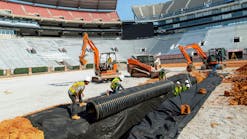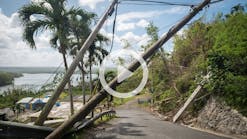Ohio City Tightens Storm Water Regulations to Mitigate Residential Property Flooding
Broadview Heights, Ohio is likely to tighten its storm water control requirements to curb flooding on residential properties.
Under legislation proposed by the administration, developers building homes and businesses would have to provide infrastructure that can handle a 100-year storm, reported Cleveland.com. This includes sewers, culverts and manholes.
Current code requires new developments to handle 50-year storms. Councilman Joe Price said during a Jan. 4 council committee meeting that 100-year storms are happening more frequently.
Mayor Sam Alai said the city will address the larger issue of flooding as part of the master plan review process, which has been delayed due to the COVID-19 pandemic, according to Cleveland.com.
Developers would have to reduce the amount of storm water flowing from their construction sites by an additional 20%, according to Broadview Heights Engineer Gary Yelenosky, reported Cleveland.com. Developers will also have to build storm water detention and retention basins that will hold more storm water as a result.
The City Council’s Service and Safety Committee unanimously approved the new standards and sent them to council for consideration on Jan. 4, 2021. In October, the council placed a six-month moratorium on new residential developments. According to Cleveland.com, the moratorium resolution suggests it might be due to water problems.
The newly formed group of residents, Citizens Coalition for a Better Broadview Heights, is concerned about how future home construction might worsen flooding in existing neighborhoods.
According to Yelenosky, a 50-year storm to a 100-year storm standard will mean that construction will be more expensive for everyone, particularly when the city builds or replaces storm sewers, reported Cleveland.com.
The extra cost can be offset by state funding that traditionally has been available for municipal storm sewer construction projects.






